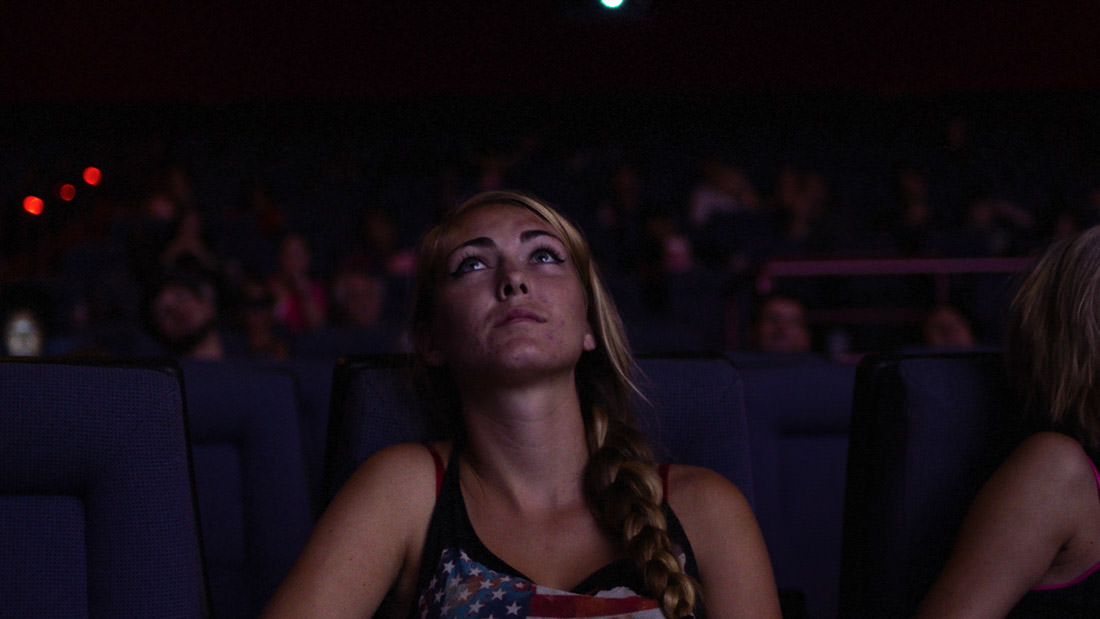It kind of feels appropriate that the last movie I’m planning
to write about from this year’s Sundance Film Festival is also one of its most
elliptical, a hard film to describe to those who haven’t seen it and a work
that tries to encapsulate something about America in the ‘10s in its unique
structure and mood. It’s also a film about cinema as a unifying event, and how
even that has been threatened by a gun culture that has turned movie theaters
into potentially unsafe places. At every screening at Sundance, I was asked to
open my laptop bag and my coat. Were they looking for a camera or a gun? They
never said, and I always complied of course, but it added to a sense of unease,
which is something Tim Sutton’s “Dark
Night” traffics in: the sense that something’s not quite right in this
world.
The obvious comparison for “Dark Night” is Gus Van Sant’s “Elephant,”
another film that enigmatically captured a national tragedy four years after it
happened. The tragedy in this case is the movie theater shooting in Aurora at
the screening of “The Dark Knight Rises” by James Holmes in 2012. But Sutton’s
film is not anything close to a retelling of that event. It is a far more
enigmatic, poetic piece of filmmaking that’s more about the impact of the
Aurora shooting than providing answers as to why it happened or exactly what
happened. It’s almost like a dream someone would have after hearing about what
happened on that horrible night. At one point in the film, there’s even a TV
broadcast in the background with a story about Holmes on it. In Sutton’s film,
the shooting has happened and is going to happen at the same time. It’s a dream
state, a nightmare of gun violence and what accessibility to weapons does to
the safety of humanity.
Against this background of placid suburbia, “Dark Night”
introduces us to a variety of suburbanites going about their lives on a lazy
summer day. “Dark Night” is filled with routine, almost ritual behavior. People
play video games, smoke, hang out, skateboard, go to the store—they exist
sort of in a state of limbo, almost as if Sutton is reminding us how the
victims of shootings like the one in Aurora were ordinary people like you and
me. They go about their lives—playing with their phones, walking through
parking lots—as someone plans a mass murder. The approach works better than a
traditional thriller, although will be far too obtuse for some viewers. The cinematography by Helene Louvart moves fluidly with these characters, and “Dark Night”
can be a beautiful film.
These people could all be victims; these people could all be
killers. It’s almost as if the real Holmes has been divided among them. One has
dyed hair like Holmes. One tries on a Batman mask. One is being interviewed by
an unseen filmmaker as if he did something about which we never learn. One
breathes heavy as he carries an assault weapon through his neighborhood. There
are times, like this one, when Sutton’s film can be a bit more blunt than I’d
like—for example, the singer croons “Please don’t take my sunshine away” as a
man with a gun prowls the area—and even its title as a play on the Christopher Nolan film feels a bit too clever.
However, I still felt the impact of “Dark Night.” One character
says, almost a little too self-aware of the movie he’s in, “Humans are ethereal.”
When national tragedy strikes, we often lose sight of the fact that it didn’t
come from a poisoned, “other” part of the world. It emerged from parking lots
and multiplexes like the ones most of us travel on a regular basis. By focusing
so heavily on the mundanity of life leading up to horror, Sutton’s film reminds
us how the threat of violence is not a special one—it is there for all of us,
even as we sit in a darkened theater.












